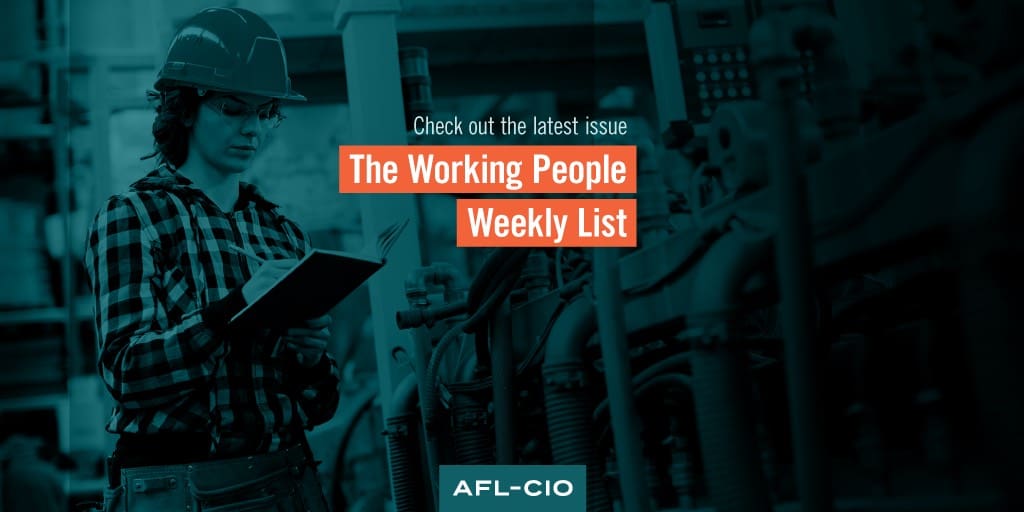We’re Not Slowing Down: The Working People Weekly List

Every week, we bring you a roundup of the top news and commentary about issues and events important to working families. Here’s the latest edition of the Working People Weekly List.
We’re Not Slowing Down: The Labor Movement Must Keep Up The Fight For Voting Rights: “On behalf of the AFL-CIO’s 12.5 million union members who fight for the rights of all working people, including the 1.7 million educators, paraprofessionals and school personnel in the American Federation of Teachers, we are going to continue to stand for voting rights and speak out against racial discrimination and voter suppression. Because we simply cannot afford to ignore what is unfolding across this country at breakneck speed. On January 6, 2021, empowered by President Trump’s green light to overturn the will of the people, an extremist mob tried and failed to violently overturn a free and fair election. We witnessed one of the greatest assaults on our democracy since the Civil War. And even though the insurrectionists failed in that attempt, extremist efforts to subvert our election process did not end on Jan. 6.”
AFL-CIO President: Congressional Staffers ‘Have a Home in America’s Unions’: “‘To the brave congressional staffers sharing their stories and speaking out for change, we stand with you. The labor movement has been watching recent developments on the Hill very closely. You are demanding better pay and working conditions and you have a home in America’s unions,’ Liz Shuler, president of the AFL-CIO, said in a video.”
Higher Black Unemployment Tests Fed’s Goal To Be More Inclusive: ““The Fed is playing with fire,’ said William Spriggs, a professor of economics at Howard University and the chief economist of the AFL-CIO, the labor union group. ‘And if they get it wrong, we’re all in trouble.’ For Spriggs, the Fed’s plans to raise interest rates in March bring to mind 2015, when the central bank approved the first increase after the Great Recession. At the time, millions of disadvantaged workers had yet to be drawn back into the labor force. Rates of unemployment among black workers, while declining, remained almost double the rate of white unemployment for years, while wages stagnated.”
Construction Union Leaders Hail Biden’s Pro-Union Executive Order: “Construction union leaders hailed President Joe Biden’s Feb. 7 executive order requiring that federally funded construction projects worth at least $35 million be built by unionists using Project Labor Agreements. ‘Just remember, it ain’t labor—it’s unions’ that built the country and will do so again, Biden declared to a union crowd at the Ironworkers Local 5 hall in Upper Marlboro, Md. Sean McGarvey, president of North America’s Building Trades Unions, spoke for the others—including Local 5 members at Biden’s signing ceremony—in declaring how Biden’s order would improve workers’ wages, working conditions and health and safety. ‘Project labor agreements are often effective in preventing problems from developing’ on construction sites ‘because they provide structure and stability to large-scale construction projects,’ Biden’s order explains. That’s ‘welcome news for all workers, union and nonunion,’ McGarvey pointed out. ‘Project Labor Agreements address labor supply, secure workers’ classification, set good wages, promote strong health and safety standards, and ensure large-scale projects are completed on time, with the highest degree of quality, efficiency, and safety.’”
Over 300,000 U.S. Federal Workers Eligible for Unions, White House Says: “Liz Shuler, president of the AFL-CIO, the country’s largest labor federation, comprising 57 affiliated unions and 12.5 million workers, told Reuters the U.S. labor movement will ‘be the eyes and ears on the ground,’ making sure the report gets implemented. ‘I think this could be a game changer, to have the power of the federal government examining itself and how its practices can be utilized to advance worker organizing,’ she said.”
President Biden Adopts Steps for Promoting Union Membership.: “The White House on Monday released a report outlining several dozen steps it intends to take to promote union membership and collective bargaining among both public and private sector employees. The report is the product of a task force that President Biden created through an executive order in April. A White House statement said the president had accepted the task force’s nearly 70 recommendations.”
Amazon Warehouse in Alabama Set to Begin Second Union Election: “Mr. Appelbaum, the union president, said the on-the-ground presence of other unions was substantially higher than last year, thanks partly to the urging of Liz Shuler, the president of the AFL-CIO, of which the retail workers union is a part.”
Connecticut’s Essential Worker Relief Fund a Model Other Governments Should Follow: “The creation of the relief fund was spearheaded by organized labor in the state, with Sal Luciano past president of the Connecticut AFL-CIO, saying ‘This fund will help potentially thousands of essential worker—healthcare workers, first responders, grocery store workers, bus drivers, corrections employees, and many others—who contracted the novel coronavirus on the job through no fault of their own. Many ended up with out-of-pocket medical expenses and lost wages.’”
Mills Administration Cracking Down on Employer Wage and Hour Violations: “Since Gov. Janet Mills took office three years ago, the Maine Department of Labor has escalated its pursuit of illegal workplace practices including wage theft, child labor and false record keeping, a significant departure from past practices at the agency. ‘I think it is really significant and important that the department is making this information public and really trying to move forward with smart, strategic enforcement,’ said Matt Schlobohm, executive director of Maine AFL-CIO, a coalition of labor unions that represent 40,000 workers in Maine. ‘I think it is also true that there is much more across the board that all of us need to do to create a culture of compliance and make sure the law is respected in the workplace.’”
Kenneth Quinnell
Mon, 02/14/2022 – 15:13